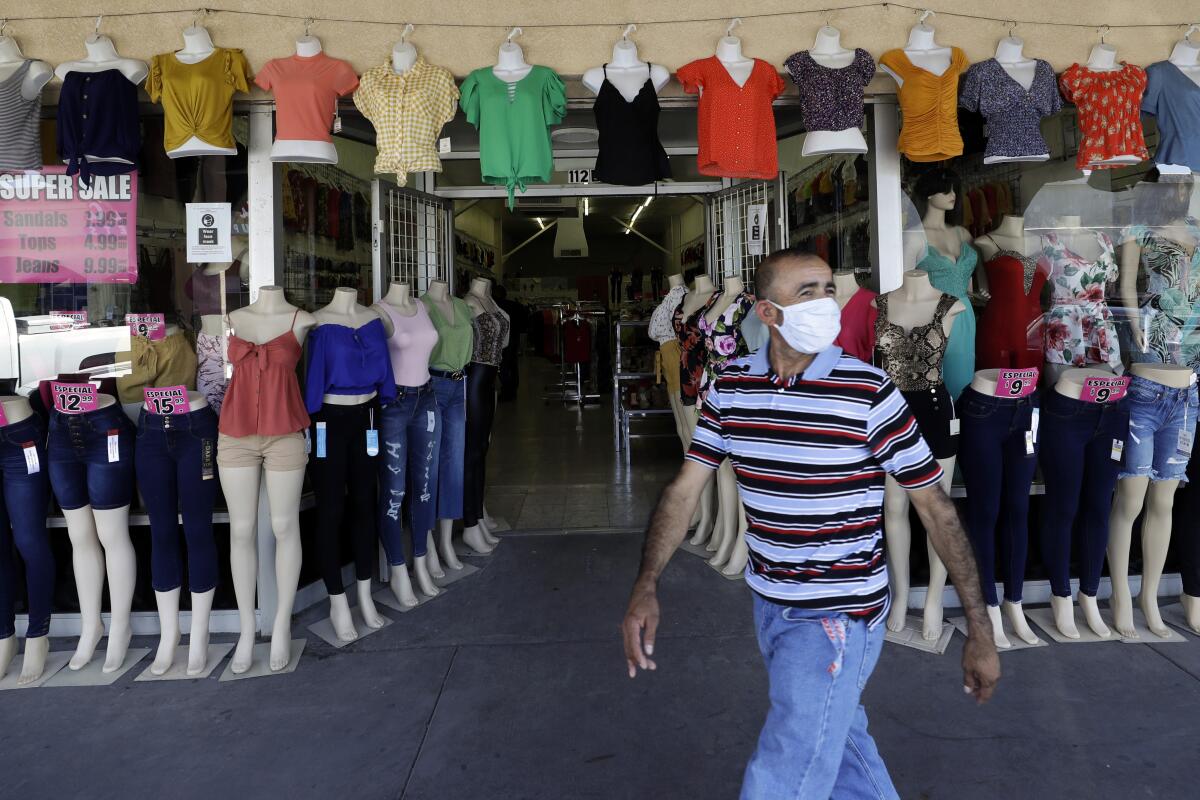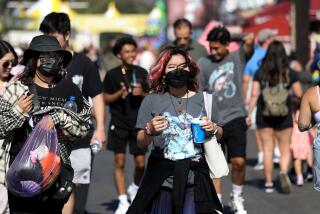Its two hospitals overrun, Imperial County halts in-store retail and indoor religious services

Gov. Gavin Newsom warned Imperial County officials Friday that he would “intervene” if they didn’t take steps to control the spread of the coronavirus. Almost a week later, county officials have rolled out a public health order closing all in-store retail and indoor religious services.
The order further states that all county parks are closed, all gatherings are barred and no residents should leave their homes unless necessary.
“Restrictions related to COVID-19 are often difficult to accept, but they have become necessary to ensure that we, as a community, all do our part to protect the health and safety of our families, friends, and neighbors,” said Luis Plancarte, chairman of the Imperial County Board of Supervisors. “We ask that you avoid the three Cs. These are crowds, confined spaces and close contact with those outside of your household.”
The new order limits nonessential retail stores to curbside pickup only. Though indoor religious services are prohibited, outdoor services are allowed with fewer than 100 congregants. Outdoor services cannot include singing, kissing ritual objects, drinking from common cups or passing offering plates.
When in public, everyone must practice physical distancing, and people older than 2 must wear face coverings. Everyone should wash their hands frequently.
The coronavirus continues to ravage Imperial County, where over 20% of coronavirus tests come back positive — four times higher than the average positivity rate across all California counties.
On Thursday, the county tallied 301 new infections, bringing the overall count to 6,824 cases. And county officials announced a particularly harrowing mark Thursday: 100 deaths.
During a statewide news briefing Friday, Newsom singled out Imperial County as the area hit hardest by the coronavirus. It’s one of 19 counties on the state’s coronavirus watchlist for rising caseloads. For every 100,000 people in Imperial County, more than 3,700 have been infected with the coronavirus. In the state as a whole, about 600 per 100,000 people have been infected.
The Imperial County coronavirus tally is a bit of an enigma.
A rural, 181,000-person county along the state’s borders with Arizona and Mexico doesn’t seem to be the prime location for virus spread. And Newsom said the county had “never moved forward [with reopening] as far as other parts of the state,” though the Board of Supervisors and a business association had pushed to reopen in June.
Still, poor economic and health factors put Imperial County at a steep disadvantage for contagion and healthcare.
According to census data, about a quarter of its residents live in poverty, among the worst percentages of all California counties. And while California averages one primary care physician per 1,260 residents, Imperial County only has one per 4,250 residents.
The only two hospitals in Imperial County — El Centro Regional Medical Center and Pioneers Health Center — have been overrun since the coronavirus outbreak. In just the last five weeks, Imperial County transferred over 500 coronavirus patients to other counties for treatment — an average of 15 to 17 people a day, Newsom said.
Some of the overflow has been attributed to an unusually high number of hospital admissions linked to cross-border traffic from Mexicali. In the Friday news briefing, Newsom said the state is “working with Customs and Border [Protection] because of issues” relating to the border in Mexicali and Calexico.
Hospitals do not disclose where their patients come from, but they do routinely treat cross-border travelers, said Karina Lopez, public affairs liaison at Pioneers Health Center. Imperial County’s population is 85% Latino, and many residents are migrant farmers or recent immigrants.
When determining which patients to care for, Pioneers Health Center does not consider a patient’s residence.
“Right now, the border technically is closed. The only people technically allowed to pass are legal resident card holders or U.S. citizens,” Lopez said. But “anyone coming to our hospital that needs care will receive it.”
Though the hospital has filled only 68 of its 107 acute care beds, it has turned some patients away.
“The main concern for us was that we do not have enough acute care nurses to care for the patients coming in. While we do have beds for them, and we do have space for them, we don’t have enough staff,” Lopez said.
For six weeks, the hospital received some additional support from the National Guard, but that program ended Tuesday. Lopez said the hospital will soon acquire more traveling nurses to support its permanent staff.
As the hospitals remain overrun and the Fourth of July weekend approaches, Imperial County officials urge residents to stay inside.
“People in our community continue to get sick and continue to die from this virus. It is critical that we all remain proactive in order to slow the spread of COVID-19,” said Dr. Stephen Munday, county health officer.
More to Read
Sign up for Essential California
The most important California stories and recommendations in your inbox every morning.
You may occasionally receive promotional content from the Los Angeles Times.











